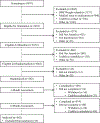A Factorial Experiment to Optimize Remotely Delivered Behavioral Treatment for Obesity: Results of the Opt-IN Study
- PMID: 32656994
- PMCID: PMC8045468
- DOI: 10.1002/oby.22915
A Factorial Experiment to Optimize Remotely Delivered Behavioral Treatment for Obesity: Results of the Opt-IN Study
Abstract
Objective: Intensive behavioral obesity treatments face scalability challenges, but evidence is lacking about which treatment components could be cut back without reducing weight loss. The Optimization of Remotely Delivered Intensive Lifestyle Treatment for Obesity (Opt-IN) study applied the Multiphase Optimization Strategy to develop an entirely remotely delivered, technology-supported weight-loss package to maximize the amount of weight loss attainable for ≤$500.
Methods: Six-month weight loss was examined among adults (N = 562) with BMI ≥ 25 who were randomly assigned to conditions in a factorial experiment crossing five dichotomous treatment components set to either low/high (12 vs. 24 coaching calls) or off/on (primary care provider reports, text messaging, meal replacements, and buddy training).
Results: About 84.3% of participants completed the final assessment. The treatment package yielding maximum weight loss for ≤$500 included 12 coaching calls, buddy training, and primary care provider progress reports; produced average weight loss of 6.1 kg, with 57.1% losing ≥5% and 51.8% losing ≥7%; and cost $427 per person. The most expensive candidate-treatment component (24 vs. 12 coaching calls) was screened out of the optimized treatment package because it did not increase weight loss.
Conclusions: Systematically testing each treatment component's effect on weight loss made it possible to eliminate more expensive but less impactful components, yielding an optimized, resource-efficient obesity treatment for evaluation in a randomized controlled trial.
Trial registration: ClinicalTrials.gov NCT01814072.
© 2020 The Obesity Society.
Figures


Comment in
-
Optimizing Behavioral Interventions for Obesity Using an Engineering-Inspired Approach.Obesity (Silver Spring). 2020 Sep;28(9):1574. doi: 10.1002/oby.22957. Epub 2020 Aug 7. Obesity (Silver Spring). 2020. PMID: 32770623 Free PMC article. No abstract available.
References
-
- U.S. Preventive Service Task Force. Behavioral Weight Loss Interventions to Prevent Obesity-Related Morbidity and Mortality in Adults: US Preventive Services Task Force Recommendation Statement. JAMA. 2018;320(11):1163–1171. - PubMed
-
- Pan XR, Li GW, Hu YH, et al. Effects of diet and exercise in preventing NIDDM in people with impaired glucose tolerance. The Da Qing IGT and Diabetes Study. Diabetes Care. 1997;20(4):537–544. - PubMed
-
- Tuomilehto J, Lindstrom J, Eriksson JG, et al. Prevention of type 2 diabetes mellitus by changes in lifestyle among subjects with impaired glucose tolerance. N Engl J Med. 2001;344(18):1343–1350. - PubMed
-
- Kosaka K, Noda M, Kuzuya T. Prevention of type 2 diabetes by lifestyle intervention: a Japanese trial in IGT males. Diabetes Res Clin Pract. 2005;67(2):152–162. - PubMed
Publication types
MeSH terms
Associated data
Grants and funding
- R01 DK125749/DK/NIDDK NIH HHS/United States
- T32 CA193193/CA/NCI NIH HHS/United States
- P01 CA180945/CA/NCI NIH HHS/United States
- P50 DA039838/DA/NIDA NIH HHS/United States
- R01 DK108678/DK/NIDDK NIH HHS/United States
- P30 CA060553/CA/NCI NIH HHS/United States
- L30 HL143668/HL/NHLBI NIH HHS/United States
- U54 TR001018/TR/NCATS NIH HHS/United States
- P50 DA010075/DA/NIDA NIH HHS/United States
- F31 DK120151/DK/NIDDK NIH HHS/United States
- UL1 TR001422/TR/NCATS NIH HHS/United States
- R01 DK097364/DK/NIDDK NIH HHS/United States
- P50 CA143188/CA/NCI NIH HHS/United States
LinkOut - more resources
Full Text Sources
Medical

